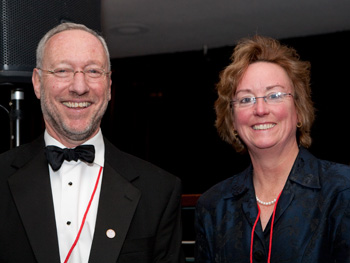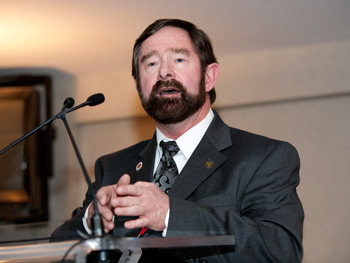Cornell event at Westminster show highlights Vet College research

Michael Kotlikoff, Vet College dean, and Peggy Reed, a member of Cornell's Baker Institute advisory council, at the annual Westminster Kennel Club Dog Show at Madison Square Garden in New York in February.
Several Cornellians discussed the strength and beauty of the purebred dog, the prestige of the Westminster Kennel Club Dog Show and Cornell's commitment to research and service to benefit the canine community at the 2010 Westminster annual event held at Madison Square Garden in New York City in February.
During a reception hosted by Cornell, more than 100 dog enthusiasts were introduced to the mapping of the canine genome, a tool capable of using canine genetics to better understand such inherited diseases as cancer, diabetes and arthritis. In addition, a variety of presenters -- including Peggy Reed, who is a Baker Institute advisory council member and an accomplished show judge, and Veterinary College faculty member Tom Kern -- discussed ideas for prepping for the show, being in the show ring and understanding the road to Westminster.

Tom Kern, associate professor at the Vet College, discusses genetic screening of purebred dogs for diseases at the Westminster event.
During the presentation, Reed shared her experiences as a show judge, including what a judge looks for when selecting winners, how to compare different breeds, what the audience should notice when watching and why Westminster is so prestigious. Kern discussed the screening of purebred dogs for genetic diseases at the Cornell Hospital for Animals and the importance of surveillance for inherited disorders.
"I invite you to think about how these beautiful and diverse breeds are helping us to improve animal and human health," said event co-host Michael I. Kotlikoff, the Austin O. Hooey Dean of Veterinary Medicine. "Genetics may be the area of veterinary medicine that holds the most promise for the future, and we at Cornell are proud to be leading the way in this comparative medicine. So when you watch the Westminster Kennel Club Dog Show and when you hug your own dogs, realize that they might be helping veterinarians and scientists in Ithaca and at Weill Cornell to find tomorrow's cures and preventions for diseases that affect their fellow canines, and all species."
Behind the scenes at Westminster.
"Every dog at the Westminster Kennel Club Dog Show is healthy because of protective vaccines that were developed at Cornell's Baker Institute for Animal Health," noted Judy Appleton, event co-host and director of the institute and Cornell Feline Health Center. "Canine parvovirus, for instance, has been a research interest at the institute ever since the original outbreak."
The College of Veterinary Medicine and the Baker Institute for Animal Health have partnered with the Westminster Kennel Club for the past seven years to add an educational component to the annual show for invited guests.